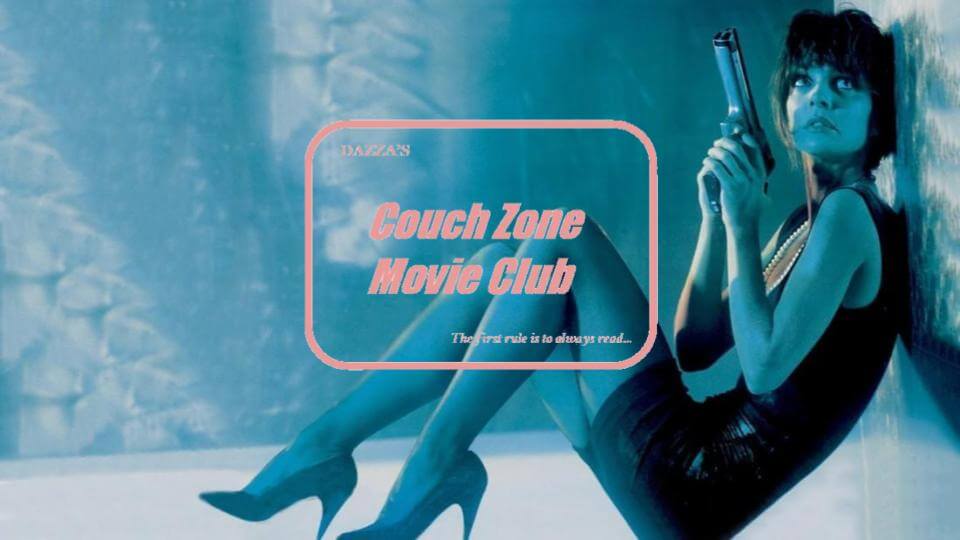Before I kick off the 90’s by presenting my three awesome movies of 1990 and one WTF? moment, I just want to share something with you.
This is what the film version of Captain America was like in 1990.

So when you’re nitpicking about the great superhero movies you get, four times a year, just look at this and what I had to watch and remind yourselves you ain’t got shit to complain about.
Goodfellas

“As far back as I can remember, I always wanted to be a gangster.”
Read any “Greatest movies of all time” style lists and when it comes to gangster films chances are The Godfather will take top spot. I’m never going to argue against that positioning, but when it comes to plain enjoyment and entertainment value, I personally will go for the gangster film that always takes the second spot.
in a poetic sense of passing the guard, Goodfellas came out the same year of Godfather Part III a risible mistake of a movie that many film fans decline to acknowledge as part of the Godfather saga. It’s also ironic that Coppola’s failure occurred around Goodfella’s success as Martin Scorsese had been put off making a gangster movie, feeling that Godfather had been the last word on the genre. Fortunately Scorsese came across “wiseguys” a book about the life of mobster and later informant Henry Hill.

In a family of gangster movies, Goodfellas is the loud, rough, working class cousin. Totally uncompromising and devoid of romanticism with regards the classic Hollywood gangster, starting with a blistering scene that sets out it’s brutal stance. Ray Liotta, Robert De Niro and Joe Pesci are driving at night and forced to pull over to investigate a noise coming from the back of the car. They surround the trunk and open it to reveal an already brutally injured man, who they viciously finish off with sickening stabs of a knife and shots from a pistol. As Liotta closes the hood the scenes freeze frames on him against a blood red backdrop and he begins his voiceover narration with the immortal line
“As far back as I can remember, I always wanted to be a gangster.”
From that opening the film never lets up as we follow the life of Henry Hill, from his youth in an Italian working class family rising from petty crimes and ingratiating himself with local mobsters to becoming a respected member of the criminal underworld. It’s a story of an insane world where crime and murder are everyday occurrences, arrests and prison a rites of passage while marriage and family life just have conform to fit in with it. Liotta’s narration runs throughout, unapologetic in his attitudes as he explains life in the mob, the rules and the code of brotherhood which he throws aside the moment he is arrested for drug trafficking and his whole life falls apart.
Through his life we encounter one of the most flamboyant array of characters ever to share a film. Even secondary characters have enough quirks and personality that within moments of meeting them we feel we know them and what they are about. Most memorably of all are De Niro as seasoned criminal Jimmy Conway and Pesci as the unstable and terrifying Tommy Devito. Pesci won an Oscar for this performance, a mobster who can flip from being hilarious one moment and vicious the next. He practically steals the movie in two scenes, one where he pretends to be offended by a remark by Hill that he’s “funny” and in a tense exchange badgers him asking “Do I amuse.” The second scene is where he crosses Billy Batts and after Batts embarrasses him in front of his friends and date, bringing up when he used to shine shoes , Pesci loses it leading to Batts ending up the guy in the trunk at the start of the film.
It’s an epic story, told over two and a half hours and told in an epic way. Goodfellas uses every conceivable film technique, freeze frames, zoom ins, long tracking shots that take us on a tour in a nightclub on the who’s who of the underworld and a soundtrack that blares out and accompanies the film with the intensity of a music video. The nadir of this is a scene that plays out to Eric Clapton’s instrumental in “Layla” where we witness the discovery of a number of dead gangsters, murdered by Jimmy to cover his involvement in a 6 million dollar robbery. As the song reaches it climax we follow Tommy making his way to a ceremony to be initiated into the upper ranks of the mob, only to find it’s a trap and he’s killed in revenge for his murder of Batts.
Goodfellas moves at a fast pace, skipping from story to story almost in anecdotal fashion. After the Luthansana heist and Tommy’s demise we never hear them mentioned again as we move onto the insanely frantic story of Henry’s wild Sunday when he is caught by the cops mid drug deal. Never does it sugarcoat that even with their charm these are bad, vicious people. Our one person to latch on to early on is Henry’s girlfriend and later wife Karen. Though her we can see the craziness of this life and the horrors it brings, but eventually she succumbs to the lifestyle when it’s going well and she too becomes a part of it.
Goodfellas is one of my favourite movies. When I first got a DVD player it was one of the first movies I bought, and it was such an early one that the film’s running time means it is spread over two sides of the disc and has to be turned over half way through.
Not since Jaws can I think of a movie that uses every facet of style and film making to it’s fullest effect. Not a shot or moment is wasted and the performances are over the top in their consistent greatness.
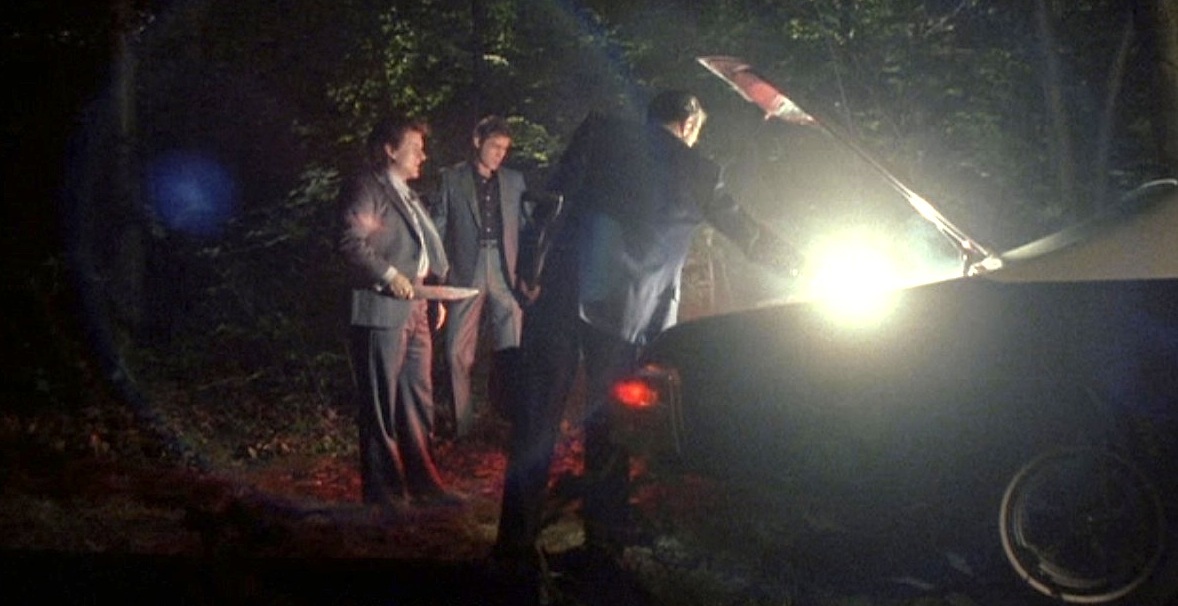
Nikita

Back in days before television went all digital, if you lived in the UK and had a SKY satellite dish then you could pick up an assortment of channels from mainland Europe to sample the cultures of our EU brethren. I pretty much used it exclusively to watch WCW Wrestling dubbed with German commentary and, I almost blush to admit it, the gameshow “Tutti Fruiti” (look it up yourselves).
I also got a taste for watching foreign movie trailers. One in particular intrigued me, for a French film called simply “Nikita.” Without the benefit of subtitles I had to rely solely on the visuals, which showed a young woman who seemed to be living a double life as some sort of secret agent. The trailer switched between scenes of her enjoying a romance with a sickeningly handsome European gent to others showing her armed with a sniper rifle while in her underwear and a striking shot of her running in a short coctktail dress brandishing a massive handgun, high kicking a guard and diving through a kitchen vent to escape an explosion.
I began to love the trailer with it’s deep, moody music and a sweaty, dirty vibe to it that was refreshing in the face of the bright and blandly clean looking Hollywood action films Stallone and Norris were serving up at the time. Yet without knowing where my nearest arthouse cinema was, or even that such a thing actually existed I was doomed to only see this two minutes of this tantalising film.
The day I recognised the lady in the cocktail dress on the sleeve of the video case in my local Blockbuster was one of those Randall in the good video store moments. The film was worth the wait, opening with a long tracking shot of a road and settling on a street gang marching towards a chemist they intend to rob for drugs, while a searingly cool pounding beat plays as the title “Nikita” fills the screen in glorious red letters.
The robbery descends into a shootout with police of which only the drug addicted Nikita survives. Sentenced to prison for murdering a policeman in the battle, Nikita is abducted by a shadowy government agency who fake her suicide and give her the choice of successfully training as their assassin or death.
Overcoming her own self destructive nature she eventually proves herself to have an aptitude for the training and is eventually set free into the outside world, allowed to live a seemingly regular life but with the possibility of the call and a target to eliminate hanging over her constantly.
I found Nikita to be one of the coolest movies I’d ever seen up to that point. Enthused with style that seemed so exotic to me and with tense, violent action scenes the drama of which was sold incredibly by Anne Parillaud who enthused Nikita with a vulnerability despite her toughness that allowed her to show her fears in near death situations. I also liked how detached Nikita was forced to be from her missions, never knowing more than her shadowy masters needed her to, knowing little of her targets or why she was being ordered to kill them.

The film also featured a chilling character in Victor “The Cleaner” a Mister Fixit sent to clean up the mess when a mission went awry (a concept that Tarantino would also adopt for Harvey Keitel in Pulp Fiction). The cold, ruthless Victor was played by Jean Reno, who would star as a gentler take on the role in Besson’s American made Leon.
I adored Nikita the film and fell in love with the hot headed, brash, tough but emotional character. So enduring was she that she spawned a Hollywood an almost scene for scene remake just a few years later in The Assassin, staring Bridget Fonda and surprisingly was nowhere near as good. Much better was the television series La Femme Nikita in 1997, which although being more outlandish and nearer James Bond in tone than the film was still a fun and popular show. Yet another show appeared in 2010 starring Maggie Q that was a tight modern take on the story, featuring a Nikita who has escaped “The division” and is plotting to bring them down. It was an exciting action series with twists and a serious tone that lasted for four seasons.
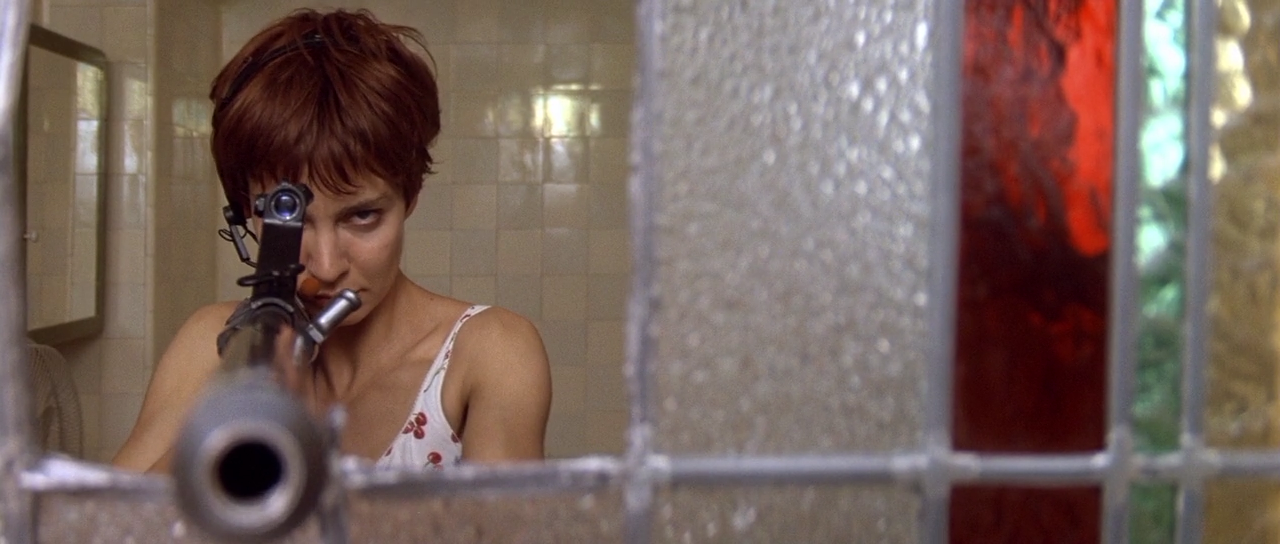
Misery

It’s funny how you can look at a movie some thirty years later and award it a whole new sense of relevancy.
Because when you look at Misery, it’s a story that is literately decades ahead of it’s time. So much so that if it had been released today, without changing anything the character of Anna Wilkes could be considered a satirical swipe at today’s toxic fandom that plagues every form of media entertainment.
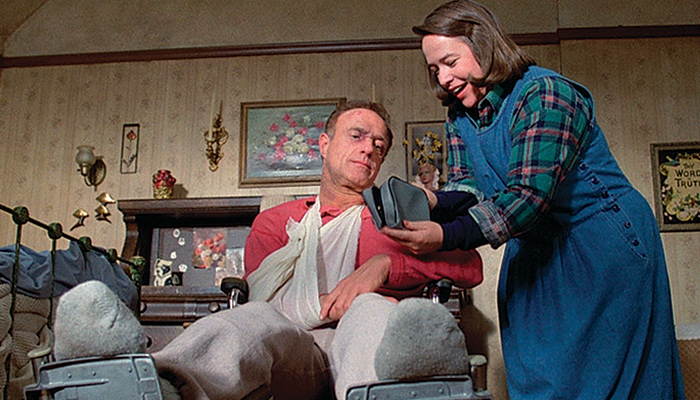
When I went to see Misery in 1990 (incidently I must have been keen to see it as at this point I rarely went to the cinema, my film viewing being exclusively built on video rentals) I was already familiar with the story of Annie Wilkes and her obsession with author Paul Sheldon and the star of his books Misery Chastain. I’d already read the Stephen King novel the film was based on and been terrified by the plight of the author who after been injured in a car crash is rescued and nursed back to health in the home of his biggest fan, the mentally unhinged Annie Wilkes.
As a fan of the book I was overjoyed how closely the film followed King’s story and all my favourite moments were included just as I’d imagined them. Annie’s meltdown when she read’s the latest Misery novel and finds her hero is killed off, her rant about the Rocketman serials and cheating by rewriting the events of their cliffhangers (to be honest that used to piss me off too) her disapproval of the language in the manuscript of Sheldon’s latest manuscript and the desolation he feels when she forces him to burn the only copy.
Kathy Bates won a deserved Oscar for making Annie Wilkes even more terrifying than I remembered in the book. Bate’s switches Wilkes from being sickly sweet one moment and ice cold and brutally psychotic the next. This is never more evident than in the sickening, gut wrenching hobbling scene where Annie breaks Sheldon’s ankles with a hammer (in the book she cuts off his foot with an axe) telling him she loves him as she does so. There were actual shrikes in the audience I was in as Sheldon’s foot falls limply to the side, even today it remains one of the most unbearably scenes to watch in a horror movie.

In the later 80’s Stephen King, ever the egotist, came up with the story of Misery to reflect his own relationship with his fans. In particular the scenario was a metaphor for those fans dismayed at King for daring to experiment with other genres and in their minds turn his back on his classic King Horror roots.
Fast forward to 2019 and it’s even more relevant as Annie Wilkes embodies the darker elements of excessive fandom given voice by the social media of today. For a start she has the obsessive streak that has lead her to know the Misery novels in the most minuet details, at times more than Sheldon himself (who she also has learned all there is to know about) and is able to scold him when the Misery novel she forces him to write to bring back the character doesn’t jibe 100% logically with his previous novels.
Wilkes is the epitome of the entitled fan, who reacts with horror when the object of her fandom does not go the way she wants. When she’s screaming with outrage that her beloved Misery is dead, she could easily be a walking dead fan taking to a message board to express their indignation that Karrrrl has been killed off.
Of course the scenario that Wilkes finds herself in is a dream come true for any incensed fan watching the film today. How many Star Wars fans who hate The Last Jedi would love to have Kathleen Kennedy and Rian Johnson captive in a secluded cabin? forcing them to rewrite and redress the direction of the Star Wars back to one of their liking? Imagine the envy they must feel when they see the power Annie has, reading and editing Sheldon’s new Misery until it is satisfactory to her.
Looking back, Misery introduced the world to the concept of toxic fandom and revealed that the world was full of Annie Wilkes all taking their love of fictional characters to dangerous levels of obsessions. What it never considered, is what if someday something could come along that would link all the Annie’s together.
WTF??? Pretty Woman

Trailers can be misleading at times. Take the trailer for Pretty Woman, the smash hit comedy that in 1990 was only bettered at the boxoffice only a film about a boy being left on his own who would grow up to be Jigsaw and one about Patrick Swayse becoming a ghost. In this trailer Richard Gere is a rich businessman who gets lost and has to pay a Julia Roberts as hooker for directions to his hotel. The trailer suggests the two get on and Gere pays her to act as his date for a week to go to a wedding. Naturally comedy ensures as the odd couple go shopping, have dinner etc and naturally the business relationship grows into love.
It’s a typical Hollywood fairytale, kind of a modern day reworking of My Fair Lady. It struck a cord with the public, amongst them my mum who had a thing for Richard Gere anyway and thought the trailer was wonderful. That Christmas I bought her a VHS copy and over the holidays we sat down as a family to watch it.

Things got a little awkward as the film wasn’t as innocent as the charming trailer had suggested. For a start after Roberts get Gere back to his hotel, he decides to hire her hooker services for the night (something that the trailer bypassers) and in a rather creepy scene of the two getting to know each other the night concludes with her giving him a blowjob.
After that the film kinda rights itself in the romantic comedy we’d been sold on. Even so early on it proved a fairly awkward viewing experience.
However the original premise for Pretty Woman was for a much darker and grittier movie.

The film that was to become Pretty Woman was originally conceived as 3,000, a film named after the amount that Gere’s character pays for Robert’s time for the week. This was to be a less romanticised view of the life of sex workers and Robert’s character was to have been a cocaine addict.
The original ending for the film was to have been much bleaker. The exact nature of the ending differs depending on who tells it (in truth films going through various ideas so it’s possible all of them were considered at some point) but it seems that after the week was over Roberts would have ended up returning to her life as sex worker with her and her friend using the 3,000 dollars for a trip to Disneyland, with some reports that Gere throws her out of the car when she’s unable to stay off drugs and throws the money over her. The more extreme scenarios see Roberts actually dying of a drug overdose.
Whatever the details it’s clear Roberts and Gere were not meant to be together. Somewhere along the line, possibly due to the chemistry between the two leads, Disney went with the fairtytale ending. Roberts was catapulted to stardom, Roxette got a number one hit record and my mum very much enjoyed the film.

And just to hammer my point home one more time, this is what Hulk vs Thor looked like in 1990.
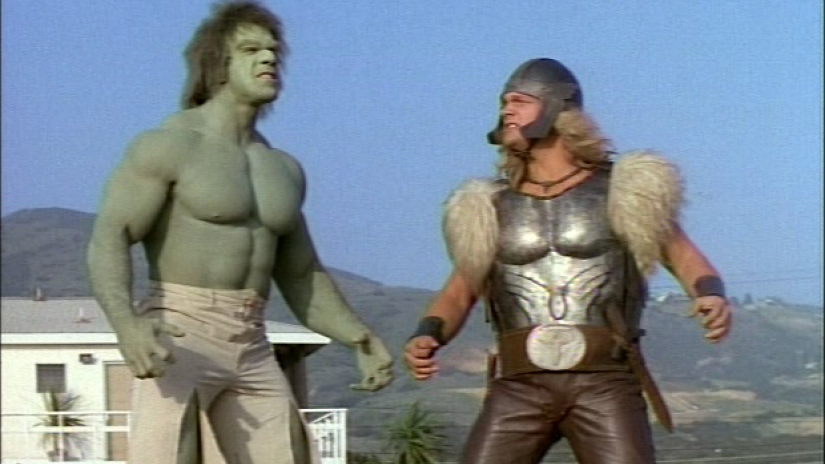
Dazza

